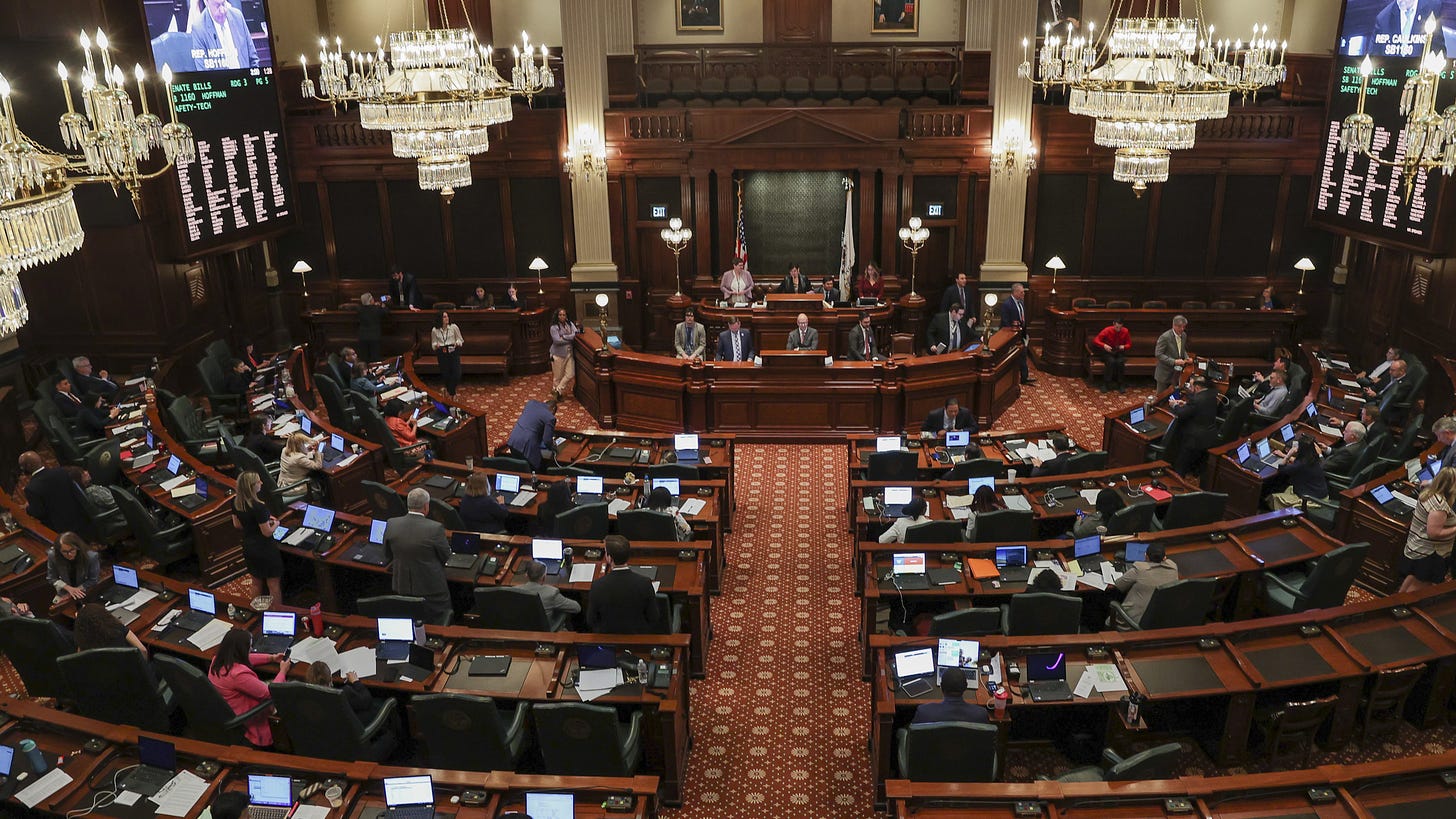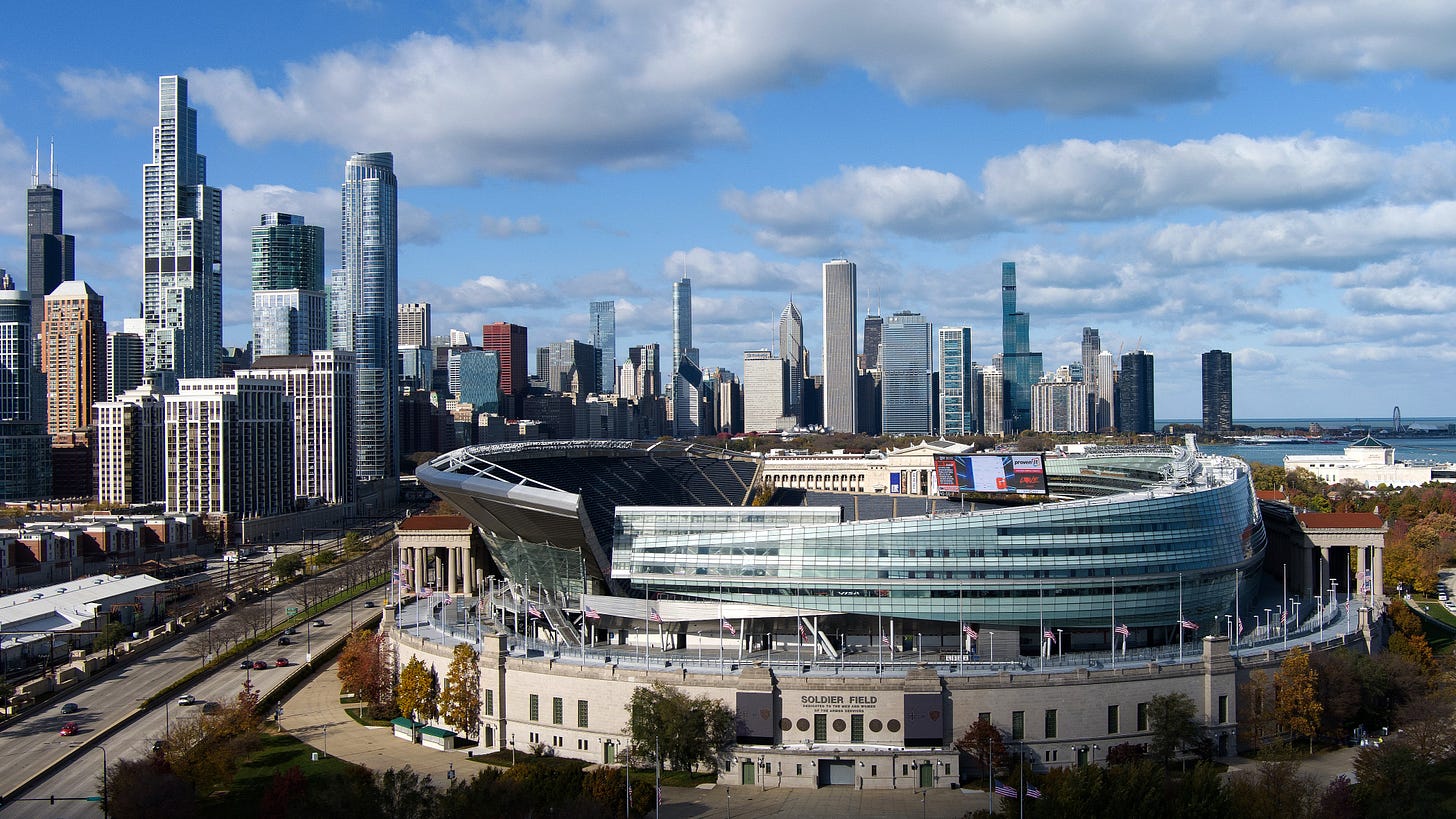THE ILLINOIZE: Monday Free for All...The budget mess...The Bears bluff...What changed with BIPA?
May 22, 2023
Good morning, Illinois.
We weren’t actually expecting the legislature to to hit their own deadlines, did they?
The House and Senate come back Wednesday. There is nothing on Governor Pritzker’s public schedule. He hasn’t made any public statements in 11 days.
Paid subscribers got multiple breaking news updates last week and I presume there will be more to come this week. Join us as a subscriber below and don’t miss a thing:
Let’s get to it.
YOUR MONDAY FREE FOR ALL
(note: we’re not responsible for paywalls and restrictions from other news outlets, but know good journalism isn’t free)
Democrats fail to come together on budget as pressures build over spending, shaky economy (Chicago Tribune)
The failure of the Illinois legislature to enact a budget by its self-appointed Friday deadline points to stresses within the state’s one-party, big-tent Democratic rule, while at the same time the Republican minority failed to seize an opening to criticize Democratic priorities and overspending.
As lawmakers went home for the weekend prepared to return to Springfield on Wednesday, Democrats continued to publicly project an image of unity as negotiations on a $50 billion spending plan went into overtime, knowing the real deadline — and pressure for enacting a state budget — is the end of the month.
”When we came to Springfield in January, we made it clear that our top priority was a fiscally responsible budget that prioritized hardworking Illinoisans. That continues to be true,” Senate President Don Harmon of Oak Park and House Speaker Emanuel “Chris” Welch of Hillside said in a statement in announcing the extra spring session days next week.
”Conversation is ongoing and negotiations are productive. We are committed to passing a good, balanced budget for the people of Illinois,” said Harmon, in his fourth year as Senate president, and Welch, in his third year as speaker.
But several Democratic stress points were evident in the failure to produce a budget on schedule.
They include legislative reluctance to face budgetary constraints after years of a pandemic-relief fueled economy pumping extraordinary dollars into the state treasury, as well as the powerful influence racial and ethnic caucuses hold in dealing with new legislative leadership that wants to avoid the top-down dictating style of former House Speaker Michael Madigan.
Democratic lawmakers also want to avoid making politically difficult decisions affecting powerful voting constituencies after the COVID years during which lawmakers largely allowed Democratic Gov. J.B. Pritzker to control the state with — and take the criticism for — his emergency orders.
At the same time, Pritzker, who has made ambitions for future presidential consideration clear, doesn’t want to be forced to cut programs or make other changes that could damage his political viability or credibility on a national stage.
House Republican Leader Tony McCombie of Savanna and other House GOP lawmakers held a news conference on Friday, in part, to shame the Democrats for not finalizing a budget by the end of their self-imposed deadline.
”Illinois Democrats have the largest majority in history and yet cannot abide by their own set schedules,” said McCombie, who has been in the leadership role only since November.
Yet McCombie also went into the traditional Republican complaints about being cut out of the budget-making process, and went so far as to say she is already focused on GOP involvement in the budget for the fiscal year 2025, which begins one year from July 1.
Related: State lawmakers fail to finish budget, school district map, so they plan to try again next week (Chicago Sun-Times)
Illinois lawmakers head back to Springfield next week as budget talks continue (Bloomington Pantagraph)
Not done yet: General Assembly continues past scheduled adjournment (State Journal-Register)
As leaders extend session with budget unfinished, several sweeping last-minute bills surface (Capitol News Illinois)
Budget delay irks Republicans (WTAX)
Editorial: Illinois literally can't afford to let good intentions run rampant (Champaign News-Gazette)
Martire: Despite recent surplus, Illinois' tax policy remains deeply flawed (Champaign News-Gazette)
OPINION: Call the Bears' bluff on subsidies (Crain’s Chicago Business)
It’s clear to anyone paying attention that the Chicago Bears are leaving Soldier Field for Arlington Heights.
Anyone, it seems, except politicians in the northwest suburbs, who apparently believe the team won’t come without generous taxpayer subsidies. State legislators who represent the area in Springfield are pushing a bill in the Illinois House that would authorize the village to give the Bears a special deal on property taxes. Village officials haven’t spoken out on the bill, but it’s unlikely the legislators would float the subsidy measure if local leaders weren’t onboard.
The bill responds to the team’s insistence that its plan to convert the shuttered Arlington Park horse-racing track into a $5 billion stadium-retail-residential-entertainment complex just won’t work unless taxpayers pay for infrastructure improvements on the non-stadium portion of the project.
Hogwash. The Bears are coming to Arlington Heights, and they don’t need a dime of taxpayer money to do it. Acquiring Arlington Park is a massive real estate play that will generate rich returns for team owners. They can afford to cover all the costs themselves, as the Ricketts family did when they renovated Wrigley Field and turned the surrounding area into an entertainment district.
Arlington Heights leaders should follow the example of former Chicago Mayor Rahm Emanuel, who refused to give the Ricketts any city money for Wrigley Field. Taxpayer funding for the Bears project would be both unnecessary and wrongheaded.
Unnecessary because the Bears are fully committed to Arlington Heights, notwithstanding their statements to the contrary, apparently intended to preserve some negotiating leverage with public officials. After plunking down $197 million for Arlington Park in February — and revving up the bulldozers to demolish the horse-racing grandstand at a cost of $4 million — the Bears aren’t going anywhere else.
The Bears also aren’t cash rich, so building a $5 billion stadium development ain’t gonna be easy.
Related: Hotel tax gap on bond payments for 2003 Soldier Field renovations comes at city's expense (Crain’s Chicago Business)
Editorial: Suburban lawmakers know Bears proposals need work; their efforts are helping show where (Daily Herald)
Editorial: Listen to two suburban mayors: Bears’ Arlington Heights plan will sack taxpayers (Chicago Sun-Times)
Illinois business, health care, tech groups denounce proposed changes to Biometric Information Privacy Act (Center Square)
Business, health care and technology groups are joining forces to express opposition to proposed changes to Illinois’ Biometric Information Privacy Act.
During a news conference Friday, representatives from several groups, including the Illinois Retail Merchants Association, Illinois Manufacturers' Association and the Illinois Chamber of Commerce denounced a proposed change that was made late Thursday, the day before session was scheduled to adjourn.
An amendment filed with House Bill 3811 includes a 50% increase in the minimum penalty businesses face for violating BIPA that can be awarded in future cases. The amendment remains in a Senate committee.
“There’s not a single business organization that supports this legislation, except the trial bar,” IMA president and CEO Mark Denzler said. “Make no mistake, this is not BIPA reform. ... Just when we thought BIPA couldn’t get any worse for businesses in Illinois, lawmakers unveil a proposal that will only increase abuse of this law by trial attorneys.”
The coalition of business and technology groups had called on the legislature to make changes to BIPA after an Illinois Supreme Court ruling that said each time a person’s biometric data is collected without their consent is a violation of BIPA.
White Castle is facing potential lawsuit damages of up to $17 billion as a result of the ruling. The high court suggested the Illinois General Assembly may want to take up the issue for possible changes.
The business coalition asked for the law to be updated to require proof that actual harm occurred to individuals before imposing fines. They also wanted businesses to be allowed to use biometric technology for routine human resources and record-keeping purposes including time clocks.
SOME TOP LINKS FROM LAST WEEK
POLITICAL POTPOURRI
Harmon bill ending 'venue shopping' for constitutional challenges passes Senate (State Journal-Register)
Native American history, ride-share regulation measures clear General Assembly (Capitol News Illinois)
Fixes to cannabis law proposed to help retail applicants (Crain’s Chicago Business)
Bill to redesign Illinois' state flag awaits governor's signature (Daily Herald)
While DNC coming to Chicago might provide good vibes, experts say economic boost might be overhyped (Chicago Tribune)
Illinois tells Disney it's a great place to do business amid fight with DeSantis (Crain’s Chicago Business)
Aurora Mayor Richard Irvin’s Girlfriend, Ex-Business Partners and City Employee’s Husband Awarded Thousands in Taxpayer-Funded Grants (WTTW)
Editorial: Don’t add lanes to I-55 without more public discussion (Chicago Sun-Times)
Chesney: In Illinois, Chicago’s problems with crime are everyone’s problems (Rockford Register Star)
Opinion: Yesterday’s Radicals Have Become Today’s Establishment (Chicago Magazine)
JOIN US












